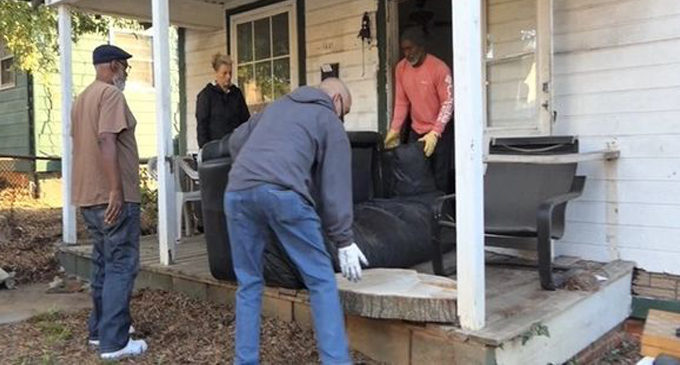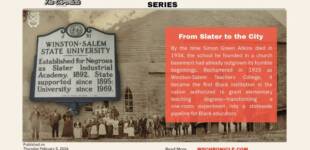Innovative ‘Do School’ brings collaboration to raising economic mobility
Pictured clockwise are: Chris Martin from FTCC; Michael Thomas (in hoodie) from Goodwill/Project Re-entry; Herman Hooper, an Army vet; & Michele Mitchell from Piedmont Federal.

By John Railey
Jerry Anderson’s new initiative ties to “Our Place, Our Space,” a move he helps lead to spur economic development in East Winston and surrounding areas. In April 2019, at a social mobility conference sponsored by Winston-Salem State University’s Center for the Study of Economic Mobility (CSEM), Anderson spoke of Our Place, Our Space, saying in his booming baritone that a new collaborative effort was needed to complement it. “I believe we can build collaborations that don’t look anything like collaborations that we used in the past.”
Now Anderson’s vision is coming to fruition. He has started, with a wide range of partners, The Do School, an innovative approach to skills training in the construction industry, crafted for marginalized residents of low-wealth neighborhoods. Participants will take part in a 20-week training program that will prepare them for jobs in the industry and, simultaneously, rehab East Winston houses for sale, revitalizing the area and providing houses for first-time homeowners and others. The many partners include CSEM, Frank L. Blum Construction, Habitat for Humanity of Forsyth County, and Jim Wolfston, the founder and president of CollegeNET, a national group based in Portland, Oregon that supports greater affordability and access to higher education.
Wolfston heard Anderson speak at the 2019 conference at WSSU and invited him out to Portland for further discussions. Wolfston, who sits on the board of nonprofit The Do School, said that Anderson is “defining and actualizing The Do School as a three-way recursion for the benefit of students and the community. The recursion works as follows: Do School facilitates individuals as they rebuild themselves and their skills as they rebuild houses and, thereby, rebuild communities. The effect of rebuilding the community thus reinforces and inspires further ‘calls’ to other individuals to jump into that recursion.”
Anderson lives and breathes this work. He is an entrepreneur who has long worked to break down barriers to economic mobility in East Winston.
“There’s difficulty getting employment,” he said. “Often it is because of the wreckage of their past. I personally know that story.”
The Do School has purchased its first property and will purchase more. It will renovate distressed properties, a training “lab” for construction work, then sell them as affordable housing to support the school. Sustainability is key, Anderson said. Willette Mosby-Reynolds, who has long experience with Habitat, serves as the project manager for The Do School. And most important, board chairman John Lenham, the project manager for Windsor Construction, has provided solid leadership, Anderson said.
Anderson said they started Nov. 2 with four participants with training at Habitat for Humanity, then will move on to their learning lab at Underwood Avenue, a pilot program.
Wolfston said: “Unlike a traditional university curriculum that inculcates general principles and fundamental skills that are then later applied by the student upon graduation, The Do School is premised on a pedagogic strategy of ‘specific to general.’ Do School starts with a specific need and opportunity: Let’s rebuild a house. All participants begin their work on the project by establishing an inventory of tasks and tools. All participants then develop and execute a plan of action.
“As work, mistakes, and rework happen, personal skills, knowledge, satisfaction, and wisdom develop. Participating students and faculty thus leverage and carry forward the personal and collective skills, satisfaction, and confidence from meeting the specific challenge into general principles and wisdom. This is, of course, very much like what we try to do every day as we solve problems in our jobs and in our personal lives.”
Bill Ball, another board member and the CFO of Frank L. Blum Construction, said: “While I know that Frank Blum will participate with The Do School in the form of monetary contributions, I’m convinced that Blum’s impact can be felt much more greatly as we collaborate with our other partners to help support The Do School. I have already approached several of our key subcontractor partners – electrical, HVAC and drywall subcontractors – and in every case these FLB partners have been eager to do whatever they can to help The Do School – volunteering their own time, resources and expertise. I’m confident this type of collaboration is the key to making The Do School work, and in making the difference in our community we hope to make.”
Andersons said, “We’re off to a very good start.” In part, he credits CSEM Associate Director Alvin Atkinson, who supported his work early on, securing him a CSEM award for economic mobility. “Alvin gave me a place at the table,” Anderson said. “He and CSEM Director Craig Richardson allowed space for me to say some things that are outside the mainstream.”
Anderson works to involve more East Winston residents in efforts to break down barriers to economic mobility. “There are people who can really change the trajectory of our communities when they are fully involved,” Anderson said. “It’s part and parcel of our Place, Our Space. We must be the change we want to see. This collaborative model gives everybody a chance to operate in their lane, whatever that might be, ranging from clerical to construction.”
To learn more about The Do School, go to The Do School – Construction Training – Winston-Salem, North Carolina (thedo-school.org)
John Railey, the writer-in-residence for CSEM, can be reached at raileyjb@gmail.com.









